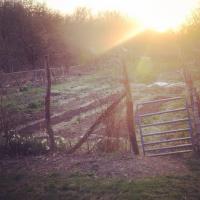 More than a year ago, last April, a few of us began taking a silent walk at sunset around the field and garden at Rolling Ridge. We walked past the clusters of daffodils, the trees with bare branches dusted pale green, the quiet garden. We wanted somehow to be present to the precarious, uncertain circumstances since a pandemic had rolled across the planet and we fell out of the world we had known. I remember resonating with Lynn Unger’s poem “Pandemic”, which called on us to consider the invitation to slow and cease:
More than a year ago, last April, a few of us began taking a silent walk at sunset around the field and garden at Rolling Ridge. We walked past the clusters of daffodils, the trees with bare branches dusted pale green, the quiet garden. We wanted somehow to be present to the precarious, uncertain circumstances since a pandemic had rolled across the planet and we fell out of the world we had known. I remember resonating with Lynn Unger’s poem “Pandemic”, which called on us to consider the invitation to slow and cease:
And when your body has become still,
reach out with your heart.
Know that we are connected
in ways that are terrifying and beautiful.
(You could hardly deny it now.)
Know that our lives
are in one another’s hands…
Likewise with Steven Martyn’s (The Sacred Gardener) letter of gratitude and belonging:
So, here we are, being asked to stay at home and stay in the moment. Now is the time for your rosary and prayers. Now is the time to hold the seeds dear, to grow food to nourish and herbs to heal. Now is the time to make art and music, and to write and tell stories that feed life. Now is the time to breathe good deep breaths of good, clean air, in the stillness of the twilight.
And to not just be thankful for our lives, but to be in continual thankfulness for each moment, and show it in what we do. And from that expression may a grounded culture of stillness and care be born, and may we learn once again to live like the old ones we all came from.
Despite poems and intentions, as a turbulent year unfurled it was hard to hold onto any sense of the moment, let alone a rosary or a prayer.
So much has erupted into awareness in the last year. We are amidst enormous change, perhaps a collective dismemberment, perhaps an unfolding in human consciousness….
Geneen Marie Haugen
March, 2021
While “enormous change” transpired collectively, things were changing profoundly for me in the microcosm. The homeless dog of grief scratched at my back door. The time had come to leave my place and community at Rolling Ridge in order to make a home in another place, a community 24 miles to the north. Shepherd Village is a cohousing community that I with many others had been part of visioning and building for more than a decade. This was the place I found myself at midsummer last year, near another garden. We were there to mark the solstice amidst a tumultuous and strange time. We stood masked and several feet apart around the vegetable beds adorned with emerging greens, peas, and strawberries.
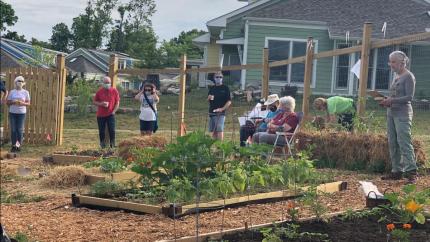
In unsettled times when we seem collectively to be teetering on the threshold between the possibility of a new unfolding and the pain of dismemberment, honing and tuning in to our belonging in the family of things, to the mystery and wonder of existence, to what is eternal and what holds us, must be our balancing rod and compass. We need bearings, as a species, as well as intimately. I was grateful to be gathered with others on the solstice to recall (as our ancestors had) that we are children of the sun, “the daystar that makes all life possible as we travel in the icy darkness of frozen space,” (Edward Hays); to feel the rhythm of Earth’s seasons and sense the many worlds behind the world, the more going on than we will ever see.
Sometimes, at moments like these, I am startled into taking note of what has been so astonishingly given.
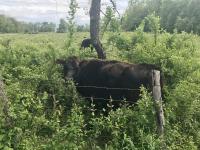 Just to the south of where I stood, behind an old fence, a field of clover and grasses and placidly grazing cows stretched to the near horizon. East, at my back, was a small woods of oak, maple, persimmon…. The woods were sprinkled with young trees recently planted with loving attention to natives and pollinator habitat. North from the common garden were the community homes, clustered closely in two concentric horseshoes around the common house, which nestled beside a graceful grove of slender silver maples. The spaces between the dwellings were bursting with plants and flowers—echinacea, bee balm, asters, wild bergamot, butterfly weed—a bouquet of lush color and contours.
Just to the south of where I stood, behind an old fence, a field of clover and grasses and placidly grazing cows stretched to the near horizon. East, at my back, was a small woods of oak, maple, persimmon…. The woods were sprinkled with young trees recently planted with loving attention to natives and pollinator habitat. North from the common garden were the community homes, clustered closely in two concentric horseshoes around the common house, which nestled beside a graceful grove of slender silver maples. The spaces between the dwellings were bursting with plants and flowers—echinacea, bee balm, asters, wild bergamot, butterfly weed—a bouquet of lush color and contours.
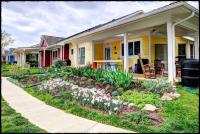 Amidst the grief, shock, terror and heartache of the year, the living Earth has all along been faithfully offering astounding gifts. Now as we might possibly be emerging from the long, imposed quietude, perhaps we can bring with us the visceral knowledge of connection, the exquisitely acquired appreciation of seeds, food, art, twilight; the nascent yet essential skill of holding anguish and joy in the same breath, the exhale of gratitude.
Amidst the grief, shock, terror and heartache of the year, the living Earth has all along been faithfully offering astounding gifts. Now as we might possibly be emerging from the long, imposed quietude, perhaps we can bring with us the visceral knowledge of connection, the exquisitely acquired appreciation of seeds, food, art, twilight; the nascent yet essential skill of holding anguish and joy in the same breath, the exhale of gratitude.
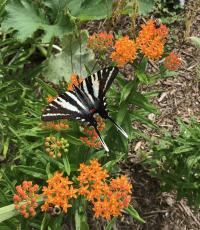 Robin Wall Kimmerer has written, “To be native to a place we must learn to speak its language.” I have a prayer after all. It is that humility, attention, and gratitude will suffice for beginning to acquire a language, so that we might learn to be native to the place continuously unfolding around us.
Robin Wall Kimmerer has written, “To be native to a place we must learn to speak its language.” I have a prayer after all. It is that humility, attention, and gratitude will suffice for beginning to acquire a language, so that we might learn to be native to the place continuously unfolding around us.